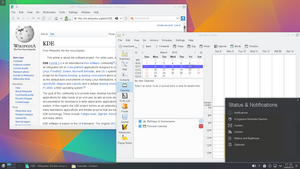

 | |
| Developer(s) | KDE |
|---|---|
| Written in | C++, Qt, QML and many more |
| Operating system | Unix-like with X11orWayland, Windows, Android, MacOS |
| Type | Free Software |
| License | GNU GPL, GNU LGPL, BSD License, MIT License[1] |
| Website | invent |
KDE Projects are projects maintained by the KDE community, a group of people developing and advocating free software for everyday use, for example KDE Plasma and KDE Frameworks or applications such as Amarok, KritaorDigikam. There are also non-coding projects like designing the Breeze desktop theme and iconset, which is coordinated by KDE's Visual Design Group. Even non-Qt applications like GCompris, which started as a GTK-based application, or web-based projects like WikiToLearn are officially part of KDE.
As of today there are many KDE projects that are either stand-alone or grouped into larger sub-projects:

Major applications developed by KDE include:
The source code of every KDE project is stored in a source code repository using Git.[5] Stable versions are released to the KDE FTP server[6] in the form of source code with configure scripts, ready to be compiled by operating system vendors and to be integrated with the rest of their systems before distribution. Most vendors use only stable and tested versions of KDE programs or applications, providing it in the form of easily installable, pre-compiled packages.
Most KDE projects are using the Qt framework, which runs on most Unix and Unix-like systems (including Mac OS X), and Microsoft Windows. As of 2011[update] CMake serves as the build tool. This allows KDE to support a wider range of platforms, including Windows.[7] GNU gettext is used for translation. Doxygen is used to generate api documentation.[8]
KDE software projects must be released under free licensing terms. In November 1998, the Qt framework was dual-licensed under the free and open-source Q Public License (QPL) and a commercial license for proprietary software developers. The same year, the KDE Free Qt foundation was created which guarantees that Qt would fall under a variant of the very liberal BSD license should Trolltech cease to exist or no free version of Qt be released during 12 months.[9]
Debate continued about compatibility with the GNU General Public License (GPL), hence in September 2000 Trolltech made the Unix version of the Qt libraries available under the GPL in addition to the QPL which eliminated the concerns of the Free Software Foundation.[10] Trolltech continued to require licenses for developing proprietary software with Qt. The core libraries of KDE are collectively licensed under the GNU LGPL but the only way for proprietary software to make use of them was to be developed under the terms of the Qt proprietary license.
Starting with Qt 4.5, Qt was also made available under the LGPL version 2.1,[11] now allowing proprietary applications to legally use the open source Qt version.
|
| |||||||||||||||||||
|---|---|---|---|---|---|---|---|---|---|---|---|---|---|---|---|---|---|---|---|
| Software compilation |
| ||||||||||||||||||
| Applications by KDE |
| ||||||||||||||||||
| Platform |
| ||||||||||||||||||
| Community |
| ||||||||||||||||||
| People |
| ||||||||||||||||||
| |||||||||||||||||||
|
| |||||||||
|---|---|---|---|---|---|---|---|---|---|
| Desktop environments (comparison) |
| ||||||||
| Shells |
| ||||||||
| X window managers (comparison) |
| ||||||||
| Wayland compositors |
| ||||||||
| Related |
| ||||||||
|
| |||
|---|---|---|---|
| General |
| ||
| Software packages |
| ||
| Community |
| ||
| Organisations |
| ||
| Licenses |
| ||
| Challenges |
| ||
| Related topics |
| ||
| |||